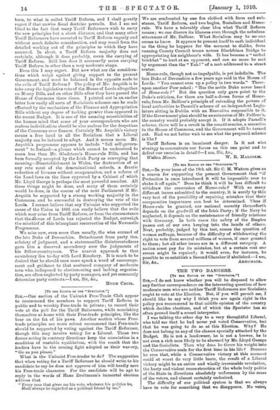[TO TIM EDITOR OF TEM " SrleCTAT02.1 Silk—One section of
the Unionist Free-Trade Club appear to recommend the members to support Tara Reform in public and to worship Free-trade in private ; to record their vote at the poll for the Tariff Reformers, while nourishing themselves at home with their Free-trade principles, like the bear on the fat of his paws. Another section whose Free- trade principles are more robust recommend that Free-trade should be supported by voting against the Tariff Reformer, though this may involve voting for a Liberal. These two forces acting in contrary directions keep the association in a condition of unstable equilibrium, with the result that the leaders have in the coming fight adopted as their war-cry, " Go as you please."
What is the Unionist Free-trader to do ? The suggestion that when voting for a Tariff Reformer he should write to his candidate to say he does not approve of him will hardly save his Free-trade character. For the candidate will be apt to reply in the words of Hans Breitmann's immortal election address that " Every man that gives me his vote, whatever his polities be, Shall always be regarded as a political friend by tne." We are confronted by one foe clothed with form and sub- stance, Tariff Reform, and two bogies, Socialism and Home- rule. We have a tolerably clear idea what Tariff Reform means ; we can discern its likeness even through the nebulous utteranees of Mr. Balfour. What Socialism may be no one seems to know. It appears to present itself to each individual as the thing he happens for the moment to dislike, from running County Council trams across Blackfriars Bridge to appropriating his neighbour's wife. It has become a " verbal brickbat" to hurl at an opponent, and can no more be met by argument than the " Tab I " of a mob addressed to a street orator.
Home-rule, though not so impalpable, is yet indefinite. The late Duke of Devonshire a few years ago said in the House of Lords: " You cannot sum up a policy in two words." There- upon another Peer• asked : "Has the noble Duke never heard of Hann-rule ?" But the question only gave point to the Duke's criticism, for there are half-a-dozen forms of Home- rule, from Mr. Balfour's principle of extending the powers of local authorities to Parnell's scheme of an independent Legis- lature sitting in Dublin with an Executive responsible to it. If the Government plan should be an extension of Mr. Balfours, the country would probably accept it. If it adopts Parnell's scheme, there will be a revolt in the constituencies, a secession in the House of Commons, and the Government will be turned out. Had we not better wait to see what the proposed scheme is like ?
Tariff Reform is an imminent danger. Is it not wise strategy to concentrate our forces on this one point and to defeat our enemies in detail P—I am, Sir, &e.,














































 Previous page
Previous page